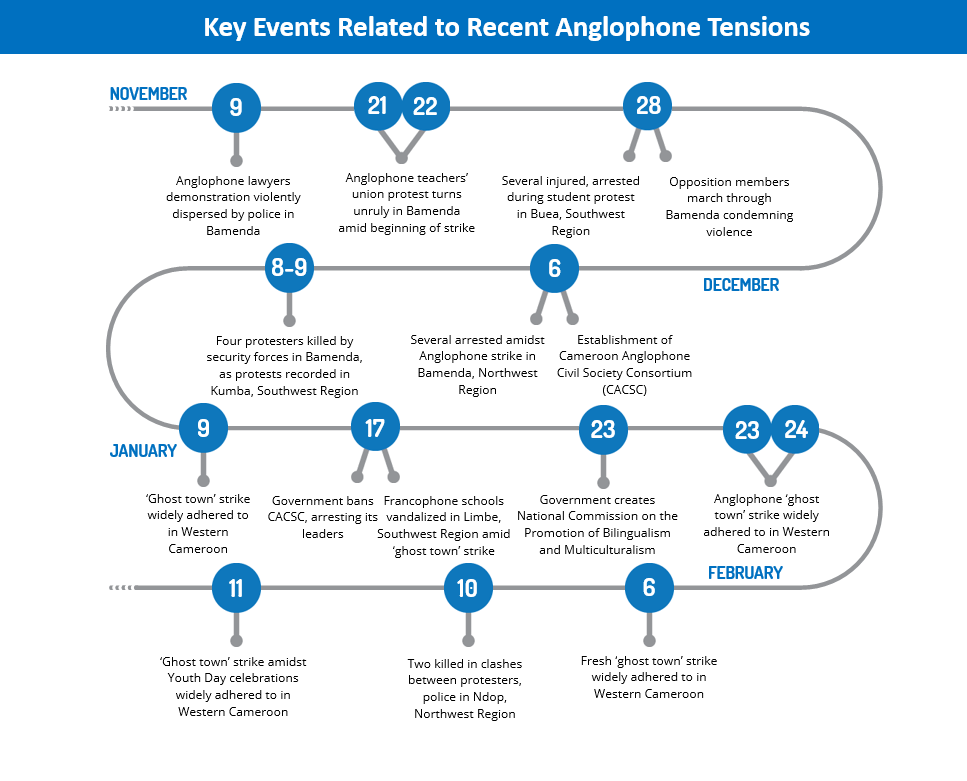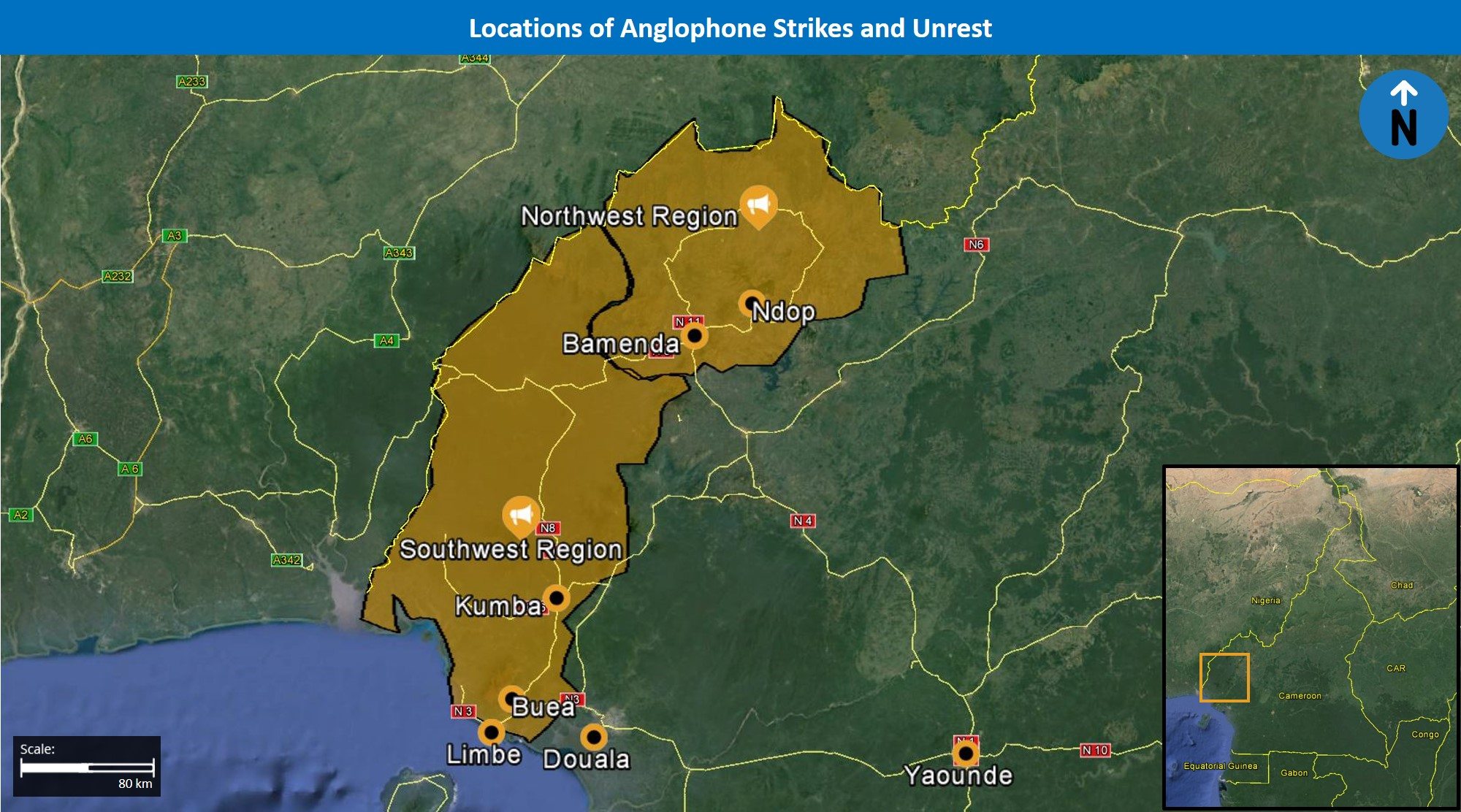Current Situation: Anglophone strikes
Since early November 2016, the Anglophone regions of Western Cameroon, namely the country’s Northwest and Southwest regions have been experiencing increased tensions over the community’s perceived social and cultural marginalization by the largely Francophone state. Although the tensions have been long, this particular period was triggered by lawyer Anglophone strikes, denouncing the appointment of unqualified Francophone magistrates, not familiarized with common law across Western Cameroon. Soon afterwards, the teachers’ unions joined in, as they protested against the imposition of French in Anglophone schools. Since then, we witnessed frequent protests and strikes by such elements throughout these regions, with the former often turning unruly.
Meanwhile, in early December, and in response to the perceived unwillingness of the Cameroonian State to address their demands these unions, along with a wide array of Anglophone civil society groups created CACSC, leading to the ongoing wave of ghost town strikes. Such Anglophone strikes have been widely adhered to across the Southwest and Northwest regions as evidenced on January 16-17, 23-24 and February 6, 11. The strikes have been largely peaceful, in alignment with CACSC’s spirit, nonetheless several isolated instances of unrest have been recorded, namely, the reported attack by disgruntled youth against Francophone schools in Limbe, Southwest Region on January 17.
On January 17, the Cameroonian government banned CACSC, subsequently arresting the latter’s leaders. Also on January 17 the Cameroonian government reportedly imposed restrictions on internet access in the Anglophone regions, which are still ongoing as of the time of writing. Additionally, the Cameroonian government has allegedly threaten with sanctions to any media outlet advocating for secession or federalism.
Click here to see Map Legend
Assessments & Forecast
Since the establishment of the Federal Republic of Cameroon in 1961, joining the largely english speaking regions of Western Cameroon with the newly formed French Speaking Cameroon, the country was established as a bilingual state. However in practice, the country has been largely run and dominated by the French-speaking majority, which accounts for eight of the country’s ten regions and 80 percent of the population. This tendency has been gradually institutionalized, especially since the government system was changed from a federation into a unitary state in 1972, and has been consolidated during the rule of longstanding President Paul Biya. This lack of institutionalized bilingualism, has created amongst the english speaking population of Western Cameroon an environment of perceived social and cultural marginalization by the Francophone State. Such marginalization has been translated not only by an increased use of French in both the educational and legal system, but also by the absence of Western Cameroonians in senior government positions. In addition, the use of French as the country’s main language has created employment obstacles for anglophone citizens. Thus, especially alienating the youth across the Northwest and Southwest Regions vis-a-vis the state, creating a hotbed for civil discontent, not witnessed in the region since the calls by the Southern Cameroon National Council (SCNC) of independence more than two decades ago. Such grievances have set the ground for the ongoing “ghost town” campaign.
This entrenched sense of marginalization allowed an initial movement of Anglophone teachers and lawyers unions seeking for social demands, to evolve into political demands that would enhance the bilingual character of the nation, particularly the reestablishment of federalism. In this context, the Cameroon Anglophone Civil Society Consortium (CACSC) has emerged as the most prominent organization amongst the Anglophone movement calling for federalism and further recognition from the largely Francophone state. With a strategy of civil disobedience through the implementation of a series of “ghost town” Anglophone strikes across Northwest and Southwest Cameroon, CACSC has succeeded in installing the debate about the reestablishment of federalism both in the national spectrum and in the international arena, as the Anglophone problem has gained momentum in the international media and intellectual spheres across the globe.
While the organization has highlighted the peaceful stance of its campaign, several isolated episodes of violence have been recorded amid their strikes, such as the clashes recorded in Ndop, Northwest Region on February 10 leaving two protesters killed. Additional organizations, such as the Southern Cameroons National Council (SCNC) have taken a more radical stance advocating for secession, calling for the establishment of the Anglophone self-proclaimed Republic of Ambazonia. As a continuation of their separatist ideology since the organization’s establishment in 1995. In this regard, several splinter groups and disgruntled youths have engaged in violent acts amid the Anglophone strikes, namely, attacks against non-compliant organizations, particularly French-speaking schools and scuffles with security forces.
Such a stance has the potential to hinder the Anglophone strikes camping, which as of the time of writing has enjoyed wide adherence and public support, given that it could generate public animosity towards the civil movement and most importantly provide justification for crackdowns by security forces. FORECAST: Nonetheless, given that such groups are likely to remain a minority voice amongst the Anglophone camp, CACSC sponsored “ghost town” strikes are likely to continue in the coming weeks, with an elevated level of adherence across the english-speaking regions.
President Paul Biya’s tight grip on power with the help of a robust political apparatus and the support of the Army has allowed him to rule the country since 1982, being the second longest-ruling leader in the whole continent still in power. In this context, the emergence of a civil disobedience campaign in the Anglophone Regions, which constitutes the stronghold of the opposition Social Democratic Front (SDF) party, marks an unusual political challenge for Biya’s regime. Thus, Yaounde has taken a hardline stance vis-a-vis the Anglophone movement as evidenced by the imposition of a ban against CACSC and the subsequent arrest of its leaders on January 17 over “terrorism” charges. Also the government imposed internet disruptions across the Southwest and Northwest Cameroon on January 17, which are still ongoing as of the time of writing, jeopardizing life and business continuity in Western Cameroon. This measure has drawn wide international criticism as prominent humanitarian organizations have labeled such policy as a sign of increased authoritarianism by the Cameroonian regime.
Consequently, the Cameroonian government has continuously framed Anglophone activists as criminals, while stressing the united and indivisible character of Cameroon and threatening media outlets of advocating for Federalism or secession. This intransigent posture underscores the perceived political backlash that eventual concessions to the Anglophone minority could have on a national level, where additional regions may see such concessions as a sign of the regime’s weakness, subsequently destabilizing the government. In this regard, as evidenced in the government’s rhetoric, Yaounde is particularly against the implementation of a federal system. Since the Cameroonian regime is based on the unified character of the country, with Paul Biya as the primary element of such unification, a federal system might create the environment for democratic expressions to emerge on the regional level, consequently, setting the ground for political criticisms that could eventually lead to substantial challenges for the regime.
FORECAST: While the government established a Commission for the Promotion of Bilingualism and Multiculturalism in order to address the Anglophone grievances, such efforts are unlikely to represent significant changes on the ground. Moreover, given the aforementioned potential challenges, Yaounde is likely to maintain their animadversion towards the implementation of a federal system, preserving the unitary character of the state. Thus, CACSC sponsored “ghost town” Anglophone strikes are likely to continue in the coming weeks, with an elevated level of adherence across the english-speaking regions. Nonetheless, if CACSC does not succeed to render real compromise from Yaounde in the foreseeable future, the strike campaign may lose its current momentum. Indeed, the great economic toll that such manifestations are having in the already deprived economy of Western Cameroon, coupled with the increased pressure exerted by parents in light of the continued teachers’ Anglophone strikes, are likely to hinder the adherence, and subsequently the success of such campaigns in coming months.
Recommendations
Travel to Douala and Yaounde can continue while adhering to heightened security precautions regarding armed criminal activity. Those operating or residing in Cameroon’s Northwest and Southwest regions are advised to allot for intermittent disruptions to business continuity, and maintain heightened vigilance, given the underlying potential for unrest arising from the aforementioned Anglophone strike campaign.

